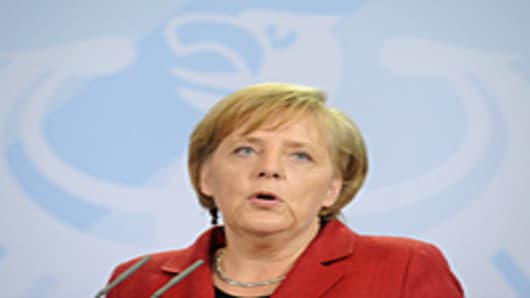Groucho Marx once said that money frees you from doing things you dislike. “Since I dislike doing nearly everything, money is handy,” said the Marx Brother.
Having spent billions of euros they didn’t have, governments across Europe are now finding out the hard way that without money they have to accept things that they would rather not be doing—namely, taking orders from Angela Merkel in Berlin and Mario Draghi in Frankfurt.
Late on Thursday, in Dublin, a scandal rocked Enda Kenny’s government when reporters got hold of the Irish budget three weeks before it was due to be unveiled to the Irish people.
According to a document seen by Reuters, Irish VAT is expected to rise by 2 percent and despite denials from Dublin, it appears very likely that Kenny’s visit to Berlin this week saw him ask Angela Merkel for approvalof his spending plans for 2012.
“The reports are undoubtedly true,” said one Irish business leader who spoke to CNBC following the reports. “A rise in VAT does nothing to boost growth, without growth you do not get lower debt.”
The problem for those pushing a growth agenda is that Angela Merkel and the German government do not yet have a growth strategy for Europe—so Europe does not yet have a growth strategy.
What Angela Merkel and Germany do have, after years of hard work focusing on export-led growth, frugal consumption and a non-intervention foreign policy, is lots of money.
The market knows it, other EU nations know it and crucially Germany knows it; and anyone who wants Germany’s support needs to listen very carefully, no matter what their people may think.
UK-German Friction
UK Prime Minister David Cameron will meet Angela Merkel in Berlin on Friday, with the Telegraph newspaper reporting the Cameron will be told he cannot hold a referendum on handing more powers to the EU.
Despite not needing the support of Germany, the UK is increasingly worried by policy decisions emanating from Berlin, which Cameron fears could drag Britain into recession .
Cameron, who struggles to sell anything tied to Europe to his own euroskeptical Conservative Party, is reported have been warned by Merkel that she expected him to “examine a stronger involvement with other countries” once the euro zone crisis has been resolved.
This will not go down well in Britain where being told what to do by the Germans has, for historical reasons, been as popular as losing to Australia at cricket or losing the empire.
The problem for the UK is that its economic future is tied to that of the euro zone and Germany is now running the euro zone. Unfortunately if Cameron wants a seat at the new EU table being formed by Merkel, he had better listen, no matter how unpopular such a decision makes him back at home.
Italy and Greece now have unelected governments that are expected to push through harsh austerity measures in return for assistance. Spain’s new government, which is likely to be elected over the weekend, will have to get sign-off for its economic policy from Berlin and Frankfurt.
Like the other members of the so-called PIIGS (Portugal, Italy, Ireland, Greece and Spain) , it acted a little like Hollywood star Errol Flynn who once said “My problem lies in reconciling my gross habits with my net income.”
Most of Europe wants the ECB to be allowed to step in and aggressively to buy euro zone bonds to help ease the debt crisis, lower yields and help foster growth. But this is not something Merkel or the German publics are willing to accept, so it is a non-starter.
Until there is a change of heart, the euro zone will be like a workforce who does not believe in their boss. They will get on with what they are told but grumble by the water cooler and tell each other that sooner or later the boss will be proved wrong, and get fired.
This could though take sometime as anyone who has disliked their boss will know only too well.




